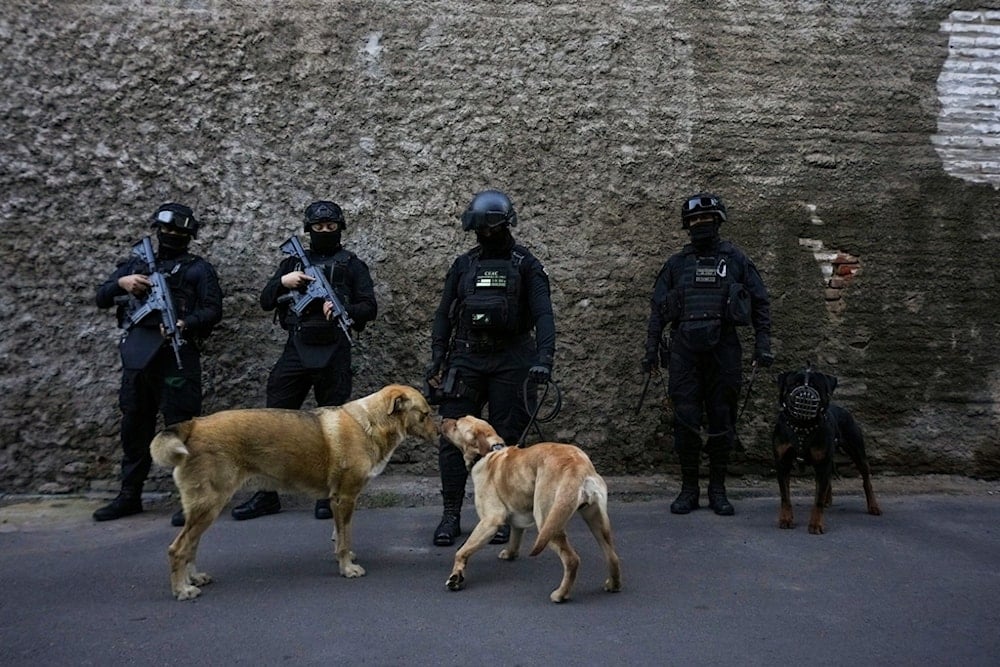US immigration policies shaped by false 'Venezuela gang' threats
False claims about a Venezuelan gang targeting US police have fueled crackdowns under the Trump administration.
-

Police stand guard before a press conference on the extradition of “Tren de Aragua” gang members from the United States, at a high-security prison where they are being held in Santiago, Chile, Wednesday, October 1, 2025 (AP)
In July 2024, a false intelligence report suggesting that the Venezuelan gang Tren de Aragua (TdA) had ordered attacks on US police officers rapidly spread across US law enforcement agencies. Initially circulated by the Albuquerque Police Department in New Mexico, The Guardian reports that the bulletin cited unverified information from US Homeland Security Investigations (HSI), alleging a "green light" to target law enforcement.
Despite offering no concrete evidence, the claim gained traction among various agencies, including the US Customs and Border Protection (CBP), the US Department of Homeland Security (DHS), and several local and national police associations.
It even informed a formal proclamation by Texas Governor Greg Abbott, who labeled TdA a terrorist organization, and was cited by Republican lawmakers as justification for aggressive immigration policies.
Read more: Most migrants in mega-prison lack criminal records: Report
FBI quietly retracts threat
Months later, the FBI issued an internal correction, stating that there was no directive from TdA to attack US police. Instead, any violent posture was deemed defensive rather than an offensive order. However, this clarification was never made public.
Documents were obtained by Property of the People, a government transparency non-profit, which requested records related to US authorities' talks on TdA, and shared the files with The Guardian.
Experts in organized crime and Latin American studies strongly refuted the initial allegations. They pointed out that TdA, while originating in Venezuela, lacks a centralized structure in the US and has not demonstrated a history of targeting law enforcement, even in Venezuela.
Political amplification and media echo chamber
Conservative-aligned US media, including Fox News and the New York Post, amplified the rumors. The narrative was also echoed by politicians like US Senator Ted Cruz and Congressman Greg Lopez, who used the misinformation to criticize President Biden’s immigration policies.
The Trump administration later used these claims to justify aggressive actions, including seven lethal strikes on vessels near Venezuela, purportedly targeting TdA members without evidence. Additionally, DHS used TdA allegations to deport Venezuelan immigrants, some without due process, to harsh detention facilities.
The propagation of these false claims had tangible consequences. Venezuelan communities across the US reported increased racial profiling and fear, as residents were stigmatized based on unverified intelligence. In Colorado, for instance, false rumors that TdA had taken over an apartment complex led to panic, despite police later confirming the claims were baseless.
Lisa Martinez, a sociology professor at the University of Denver, told The Guardian that these rumors have created a climate of fear among immigrants. "People start to feel targeted, and sometimes they are."
Phil Gunson of Crisis Group warned The Guardian that exaggerated narratives could be used to justify unlawful actions. "You can trace a direct line from this narrative that bolsters the case that TdA is a nationwide terrorist organization to these clearly unlawful efforts by the Trump administration," he said.
Read more: Maduro warns US against airstrikes, touts 5,000 Russian missiles
Experts call for accountability
Scholars and watchdog organizations criticized law enforcement for failing to verify the accuracy of shared intelligence. Property of the People's Ryan Shapiro likened the cycle to a game of law enforcement telephone, telling The Guardian, "Thinly sourced intelligence products get repackaged, covered by rightwing media, and then funneled back into new alerts."
Despite internal corrections, most agencies have not publicly addressed the issue. The lack of accountability and ongoing use of the narrative in immigration enforcement remains a point of concern for civil rights advocates and immigrant communities.
The episode illustrates the profound impact misinformation can have when amplified by official channels, particularly in shaping US immigration policy and public perception.
Read more: Suspected Mexican drug cartel allegedly shoot at US agents in Texas

 4 Min Read
4 Min Read










